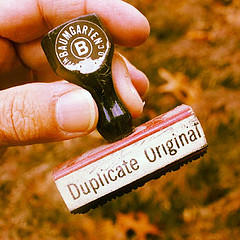Originally published at Absolutely Scott Free.
woodleywonderworks/flickr

Before I came to the online world, I spent years as a professor in traditional colleges. There, as here, I believe that the vast majority of students are honest. But I also know that under pressure, people are capable of many things. Some of the more creative cheaters I encountered were students who:
- Recorded formulas or facts in an .mp3 file, then played that file in a continuous loop on an iPod during the exam.
- Requested a bathroom break during an exam. In the bathroom was a cheat sheet taped to a stall door.
- Kept a plastic water bottle on the desk during an exam. On the inside label of the water bottle was written, in tiny script, formulas, etc. that could be seen through the water.
I share these not to give you ideas– trust me, savvy professors have seen it all anyway– but to let you know that we know. As dean of an online school now, I don’t see any of the specific examples above. But yes, we do encounter cases of academic dishonesty. And we take it seriously, I assure you. Here I thought I’d share 5 secrets about online college cheating, from a dean’s perspective:
- The main reason people cheat is because they’ve procrastinated. Cheaters often aren’t any less intelligent than their peers; they just tend to leave things until the last minute. On Tuesday night they realize that a 4-page paper is due Wednesday, and now there’s no time left. Rather than ask the prof for an extension (which may work), they give into the temptation of cut-and-paste. Which leads to…
- We’re better than ever at catching plagiarism. The Internet generation didn’t invent the concept of stealing others’ words. It’s just easier now. If you’re writing a paper about Winston Churchill , it’s so easy to simply copy huge swaths of text from Wikipedia or some other website. But guess what? We know that. Good profs can often tell that a perfectly-worded treatise sounds different from your previous work, or from your discussion board posts. And impressive technology tools like TurnItIn.com and Blackboard’s SafeAssign are used by more and more colleges. In my school, a first intentional plagiarism offense gets you a strong warning. A second gets you kicked out of the College. Ask if you’re allowed to use TurnItIn yourself to check your work’s originality before you submit it. Colleges can allow this if they want to.
- You can plagiarize yourself. Many people don’t realize this. Let’s say that you’re an English major and you take a survey course in American Literature, where you submit a final paper about Moby Dick. It’s all original work and you earn a perfectly legitimate grade of A-. Cool. Then next semester you take a course specifically on the works of Herman Melville . Here you submit that same paper on Moby Dick. Why not, you reason? It’s your work. Unfortunately, your professor may not view it that way. The word plagiarism may not be perfect here… but many professors would consider this a form of academic dishonesty. Not all would, I admit. But enough that you should worry. If in doubt, ask your professor first. You may be able to build on that paper for the new class.
- We know you can buy papers. Like plagiarism, this is nothing particularly new. Certain frats and sororities have always kept files of old papers and exams. “Taking Dr. Engel’s class on Genetics? Here’s a paper that got an A eight years ago. She’ll never remember it.” Today, though, it’s easier to find unscrupulous people online who will sell you papers generic enough to serve your purpose. The trouble here– beyond the obvious fact that lying is bad, &c. &c.– is similar to my cautions about plagiarism above. Do you think you’re the first person who ever bought that paper on social responsibility? You’re not. It’s probably indexed by TurnItIn.
- We know about online “tutoring” sites. You ought to be able to get all of the academic help you need from your college, online or not. If you aren’t, then change colleges. There may be legitimate third-party tutoring sites out there, I don’t know. What I do know is that there are scams out there where you provide your login and password to the site and they “tutor” you by having someone else complete your work. (It’s the policy of our college, and any I’ve ever worked at, that you can’t provide your login and password information to anyone else. That’s especially important at an online college, where these really represent your identity.) I suppose that may sound tempting, but it’s very dangerous. I won’t reveal exactly how we catch this, but we do. And the consequences are severe.
Some of my colleagues in higher ed may actually be upset that I’ve discussed some of these points. “Why give people ideas?” they’ll ask. But I believe in addressing elephants in rooms. I’m not teaching you how to cheat, which you probably know already if you’re so inclined. I’m telling you why you shouldn’t. As I said at the outset, I believe that the vast majority of people are fundamentally honest. I’m sure you are. And it’s the reputation of your degree that we’re trying to protect by aggressively going after the exceptions. I’m particularly interested in hearing your thoughts. As a student, have you encountered cheating? Have you ever been tempted yourself?
Dean Dalrymple
About the Author: Dr. Scott Dalrymple is the Dean of the School of Liberal Arts at Excelsior University, a nonprofit online university with 30,000 students. Before that he ran Business Administration departments at two other colleges, and before that he worked as a financial analyst and market researcher. For fun Scott writes short fiction; he has published stories in THE MAGAZINE OF FANTASY & SCIENCE FICTION, and recently won the 2010 Readers Choice Award from REALMS OF FANTASY magazine.
